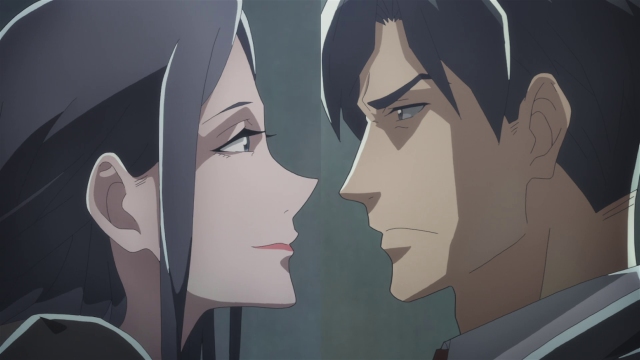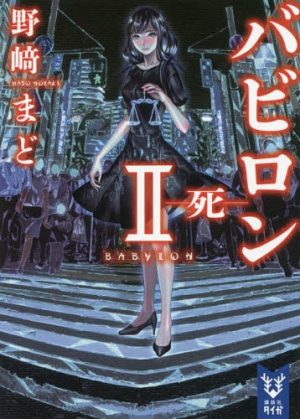
Based on the novel series by Mado Nozaki, Babylon is a political thriller that takes place in an alternate Japan. Political thrillers that directly address realistic social problems in modern Japan are a dime-a-dozen, which is what makes Babylon stand out. Most notably, this anime tackles suicide, one of Japan’s biggest problems. While Babylon is presently on hiatus upon the drafting of this article, we thought it’d be a good opportunity to share our top 5 scenes in Babylon.
-- SPOILERS AHEAD --
1. The Suicide Debate (Episode 6)
Suicide plays a big part in this series, and the debate of legalizing suicide becomes a central theme in the final minutes of episode 6. Considering Japan’s historically high suicide rates, we have to say Babylon is courageous for tackling the problem from realistic perspectives. In the debate, many politicians representing their respective parties go on TV to debate Kaika Itsuki, the mayor of Shiniki who supports legalizing suicide.
One politician debates how it affects the economy, another takes the position on how legalizing suicide can have negative effects on society, and one takes into account the human factor as to why such a law wouldn’t work. Kaika also finds ways to counter each argument and expresses how legalizing suicide can help reduce it as opposed to increasing it, as it allows people to openly discuss it more honestly instead of just hiding it.
2. The Origin of Ai Magase (Episode 5)
The true villain of this series is none other than Ai Magase. It seems that any man who has some sort of contact with her immediately commits suicide. Not only can she bend any man to her will, but she’s also a master of disguise who can blend into any environment. With Seizaki knowing she’s up to no good and that she has political ties, he does everything he can to investigate her and that leads him to her uncle who runs a clinic in Kyoto.
From her uncle, Seizaki learns that Ai was adopted and ever since she was a pre-teen, she’s always had this “power” over men, and she even used it on her own uncle while he was attempting to treat her. While it’s not explained why she has this “power,” thanks to her seductive looks, she can make men believe that she raped them when she was in junior high. As an adult, this “power” goes as far as convincing people to kill themselves!
3. Mass Suicides (Episode 3)
As to what kicked off the suicide debate in episode 6, it relates to the ending of episode 3 when a group of people committed suicide by throwing themselves off a skyscraper. Itsuki becomes the center of the debate because prior to this mass suicide, he announced his support for legalizing it. What makes this scene impactful is whether or not Itsuki organized it to make his point, or if it was just a coincidence. All the audience knows for certain is that Seizaki saw Ai on the scene, and that she was smiling about it. Considering that the people who jumped off the building were also in trance-like state, there’s no fooling the audience that Ai and Itsuki are conspiring to push forward their personal agendas (when it comes to spoiler territory, we won’t push that far).
4. Fumio’s Alleged Suicide (Episodes 1 & 2)
The alleged suicide of Fumio, Seizaki’s partner in episode 1, sets the events of this series in motion. Even prior to Fumio’s passing, they were already investigating a string of suspicious suicides and when they get a solid lead, Fumio chooses to pursue it alone. When Seizaki and Fumio share what would then become their last conversation, Fumio’s resolve in pursuing justice was just as assuring as Seizaki’s to the point that nobody would believe he had any intentions of committing suicide. Considering the conviction Fumio had in his chat with Seizaki, he was certainly murdered and shortly after, Shiniki’s mysterious suicides begin to pile up to the point that whatever happened to Fumio, wasn’t a coincidence.
5. A Boy Running For Office (Episodes 6 & 7)
As an extension of number 1, the suicide debate, one of the politicians uses an elementary student whose father wants to kill himself in strengthening his argument. The politician opposing suicide uses this boy to appeal to the audience as to how suicide can affect families. As it turns out, the boy wants to run for Shiniki’s parliament. Considering there are no age limits, he gets the endorsements of the politicians present. However, things take a sharp turn when it’s revealed that the boy happens to be Itsuki’s son. Itsuki then admits that he wanted to commit suicide so he could donate his heart to his son, who suffers from a fatal heart condition, and uses that as justification as to why suicide should be legal. However, he reconsiders his position and makes himself the good guy by clearing up any misunderstandings with his son and supporting his political aspirations. However, viewers know this is nothing more than a ploy for Itsuki to further strengthen his power.
Final Thoughts
The scenes we presented not only do an excellent job of portraying suicide as it relates to Japanese society, but making it relatable to non-Japanese viewers as well. Granted, suicide in Japan has its cultural connections, but the consequences are all the same to those affected by it no matter where it takes place. So if you or anyone you know is considering suicide, Honey’s Anime encourages you to seek proper help as we care about the well-being of our readers.
Recommended Post
6 Anime Like Babylon [Recommendations]
Recommended Post



